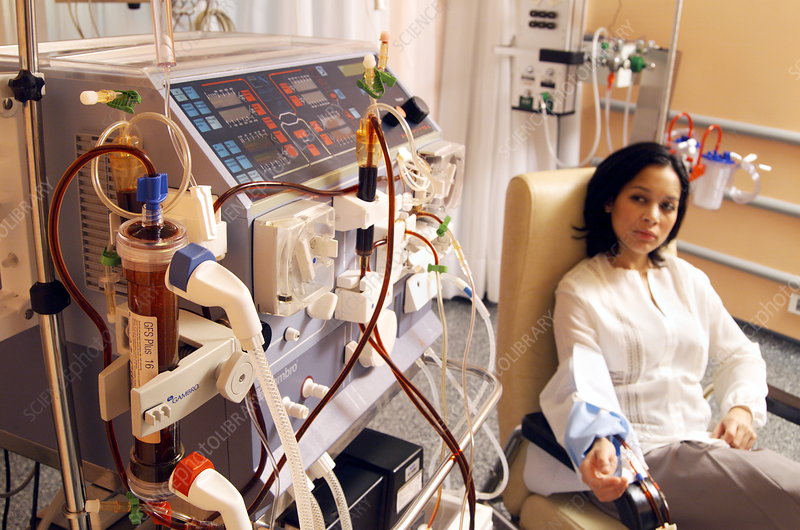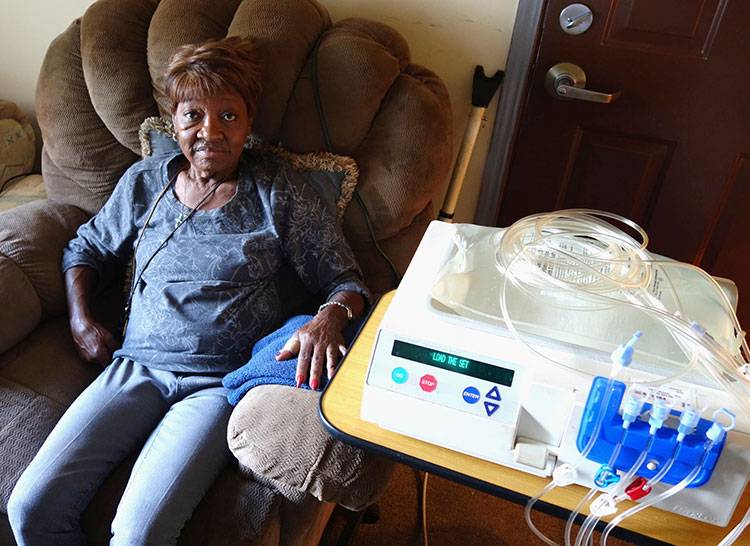Kidney disease is a major problem in the United States. Most people are born with two kidneys, occasionally one, rarely three. No matter the number, they work with similar efficiency initially. If the function of one kidney is lost (unless born with one kidney) the remaining kidney(s) can increase in size and take over the job of the lost kidney.
The kidneys lie at the small of the back and have four important functions:
1) Rid the body of waste products
2) Control the amount of fluids that stay in your body
3) Control body chemistry including sodium, potassium, calcium, phosphorous and acids
4) Release special chemicals called hormones into the bloodstream that help control blood pressure, help make red blood cells, and maintain bone health.

If the kidneys are not working, one develops waste and water accumulation in the blood loses control of body chemistry including sodium, potassium, etc. and develops high blood pressure, low blood count and poor bone health. Failure of both kidneys leads to uremia (urea is a waste product of the body). Symptoms of uremia include weakness, fatigue, nausea, vomiting, itching skin, muscle cramps, joint pains, sleeplessness, and blurred vision.
CKD (Chronic Kidney Disease) is caused by kidney failure due to a decrease of function over a period of time.
The common causes of kidney failure are:
- Poorly controlled hypertension/high blood pressure
- Diabetes
- Substance abuse at all ages, including cigarettes, cocaine, heroin, and other risk behavior leading to HIV and Hepatitis infection
- Heart Disease deprives the kidneys of much-needed blood supply to work
- Hereditary diseases such as cysts of the kidneys
- Glomerulonephritis (inflammatory condition of the kidneys) which affects the filtering function of the kidneys Kidney infections, especially those that occurred in childhood
- Blockage of kidneys from enlarged prostate and kidney stone
Your doctor will use CKD (Chronic Kidney Disease) stages to grade the level of kidney function left:
Stages of Kidney Failure
CKD Stage I: greater than 90% kidney function in individuals with a risk for kidney disease
CKD Stage II: greater than 60% remaining
CKD Stage III: kidney function of between 30-60%
CKD Stage IV: between 15-30% of function
CKD Stage V: less than 15% left – labeled as ESRD (end stage renal disease)
At CKD Stage III, your primary doctor will refer you to a kidney specialist, a nephrologist. At this stage, you will require special medications, diet, and education to prepare for possible dialysis or kidney transplantation. When the kidneys stop working, the doctor will offer dialysis or transplant.

Treatment for CKD
- Special diet (including restrictions)
- Medications
- Regular dialysis treatments
- Transplantations
- Medications
Types of Medications for Kidney Failure
- To control blood pressure, diabetes, and heart disease
- Multivitamins to replace vitamins made by kidneys and missing from the diet
- Phosphate binders to prevent bone disease caused by high phosphate
- Calcium supplements and Vitamin D3 to maintain bone health
- Iron and erythropoietin to prevent anemia
If you have CKD, you should avoid drugs not prescribed by your doctor, including over-the-counter medications. When you reach CKD IV, you will be educated about dialysis and or transplantation.
At CKD V (ESRD), kidney replacement will be recommended
- Hemodialysis
- Peritoneal Dialysis
- Transplantation
Final Thoughts
The best way to prevent kidney disease is to aggressively manage high blood pressure, high cholesterol, diabetes and obesity early so that the kidneys are not affected over time.
BLOG AUTHOR
Dr. Bonita Coe, MD
Dr. Coe is an Internal Medicine specialist with a passion for helping people learn how they can take control of their healthcare choices. She has a keen interest in writing health blogs to teach people about managing their chronic health conditions. To know more about personalized consultation services, click here to visit her profile page.


